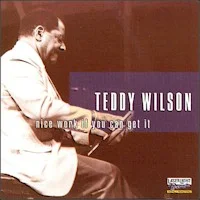Bitrate: MP3@320K/s
Time: 39:20
Size: 90.1 MB
Styles: Afro-Cuban jazz
Year: 2009
Art: Front
[2:49] 1. Cochise
[2:37] 2. One Note Samba
[2:43] 3. 110th St And 5th Avenue
[3:09] 4. Picadillo
[5:23] 5. The Big Four
[3:51] 6. Timbales Solo
[3:25] 7. Autumn Leaves
[2:30] 8. Mambo Inn
[3:10] 9. A Noro Morales
[3:25] 10. Carnival In Harlem
[1:55] 11. Jumpin' With Symphony Sid
[4:19] 12. Ritual Fire Dance
"No one in the world has done more for Afro-Cuban music than Tito Puente.” This is what Mario Bauzá - creator of Afro-Cuban jazz and legendary musical director of Machito's Afro-Cubans, stated when talking about Puente. Born to Puerto Rican parents in NYC's Harlem Hospital on April 20, 1921, Ernest Anthony Puente Jr. (not Ernesto or Antonio, as has been incorrectly stated by many) was a towering figure who revolutionized the role of percussion and jazz arranging techniques in Afro-Cuban music. A product of his environment, Puente, who passed away in NYC on May 31, 2001, grew up in the East side enclave of Manhattan known as East Harlem, the Spanish Harlem or El Barrio. It was here that he grew up listening to the sounds of big band jazz (drummer Gene Krupa was his hero), Cuban and Puerto Rican music, and emulating movie stars such as James Cagney and Fred Astaire. At the time, East Harlem (Pleasant Avenue, 1st, 2nd , 3rd , Lexington, Madison, Park, and 5th Avenue's between 96th and 125th streets) was a thriving neighborhood populated by Italians, Jews, Germans, Cubans and a growing Puerto Rican community - all of them living side by side. "Little Ernie" or Ernestito, as he became known by his boyhood friends, absorbed everything this colorful environment had to offer. He took drum lessons with an African-American show drummer named Mr. Williams, piano lessons with Victoria Hernández (Rafael's sister), as well as dance lessons. All this would serve him well in his quest to become a virtuoso multi-instrumentalist (timbales, drums, piano, vibes, marimba, alto sax, and clarinet), arranger, composer and bandleader. His first recording experience was in 1939 with the Machito Afro-Cubans and Johnny Rodríguez's Stork Club Orchestra. After serving with honors in the U.S. Navy during WW II on the escort carrier Santee CVC 29 as a gunner’s mate and musician (he was the bugler and played alto saxophone and piano in the ship's big band), he would return to NYC and quickly establish himself as a bandleader. His first hit was the 1949 mambo, “Abaniquito,” featuring Vicentico Valdés on lead vocals, Mario Bauzá on trumpet and Graciela (Machito’s sister) on background vocals. A subsequent signing to the powerful RCA label yielded classic albums that demonstrated Puente's unique ability to compose and arrange jazz oriented Afro-Cuban music and established his renowned virtuosity on the timbales, vibes and marimba. His later years with Tico and Fania would yield much more dance-oriented music. But this compilation demonstrates that Puente could produce jazz-oriented music featuring both him and his musicians as world class soloists. Hard driving instrumental mambos like “Picadillo” and “A Noro Morales” feature him on marimba and vibes. His sensitivity and romanticism on the instrument is demonstrated on the classic jazz standard “Autumn Leaves.” Puente was a master of other styles as well. Just listen to the swing of Trinidadian calypso on “Carnaval en Harlem” and Brazilian bossa nova on “One Note Samba.” The power, swing and mastery of jazz harmony that he loved to employ in writing for his big band is demonstrated in full force on “Mambo Inn,” “110th St. & 5th Ave.,” “Jumpin' with Symphony Syd” and “Ritual Fire Dance.” But it is his virtuosity on the timbales that he is best known for, as demonstrated on “The Big Four,” where he is joined by Mongo Santamaría, Carlos "Patato" Valdés and Willie Bobo. There is also the “Timbales Solo,” where he takes an incredible improvisation with just the accompaniment of a cowbell. By its very nature, jazz is an art form that demonstrates the virtuosity of musicians as soloists. Enjoy it right here as Tito plays jazz. ~Bobby Sanabria
Jazz mc
Jazz zippy




















